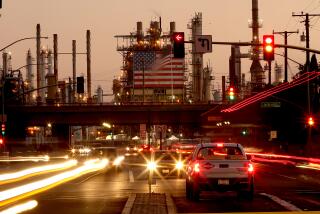IRS Slaps Arco With $1-Billion Claim for Taxes
- Share via
A long string of bullish financial news for Atlantic Richfield Co. was rudely interrupted Monday when the oil, gas and chemical company said it might face back taxes and penalties totaling more than $1.1 billion in an Internal Revenue Service dispute.
The dispute centers on windfall profit taxes owed on Arco’s Alaska North Slope oil produced between 1980 and 1983. The company said it was notified by the IRS that it might owe $557 million plus interest, which would more than double the claim.
Los Angeles-based Arco said it will “vigorously contest” the notification, which it said was a notice of proposed deficiency and not a final determination by the tax agency. The company said it will continue to try to resolve the issue through negotiations.
“If these fail, Arco is prepared to litigate the issue. If litigation becomes necessary, it will continue for several years,” the company said in disclosing the possible tax obligation.
A spokesman said Arco believes that it has booked “adequate reserves for the probable outcome” of the tax case but wouldn’t say how much that is. The official did say that it wasn’t enough to cover back taxes and interest that could exceed $1 billion.
Tax disputes often are settled for much less than originally claimed by the IRS. Accordingly, Arco said resolution of the case “is not expected to have a material adverse effect on the company’s consolidated financial position.”
The issue of windfall profit taxes on North Slope oil has been in dispute for years, and Arco said it was first notified of an audit in 1981. Last year Standard Oil--a unit of British Petroleum--agreed to pay $197 million in extra windfall profit taxes.
The government reportedly is also investigating windfall taxes paid by North Slope producers in 1984 and 1985, and IRS documents have suggested that the three major producers--Arco, Exxon and the former Standard Oil--might owe $200 million for those years.
The windfall profit tax was enacted in 1980 to prevent oil companies from collecting “windfall” profits after oil prices were deregulated at a time of skyrocketing world prices. Since prices collapsed in late 1985, the tax hasn’t been collecting any revenue.
For windfall profit purposes, the North Slope wellhead price--the basis for the tax--is determined by subtracting transportation costs from the price of the oil when it lands in California. The IRS was thought to be looking into whether oil firms overstated those transportation costs or underpriced California oil prices for tax advantages.
Arco said Monday that it used a crude oil price methodology “which conformed to the economic theory for pricing Alaska crude oil widely held by highly regarded economists, and by federal and state government pricing experts.” It called the IRS position inconsistent with policies of federal agencies and with tax law principles. Arco said it has paid almost $900 million in windfall profit taxes since 1980.
More to Read
Inside the business of entertainment
The Wide Shot brings you news, analysis and insights on everything from streaming wars to production — and what it all means for the future.
You may occasionally receive promotional content from the Los Angeles Times.










